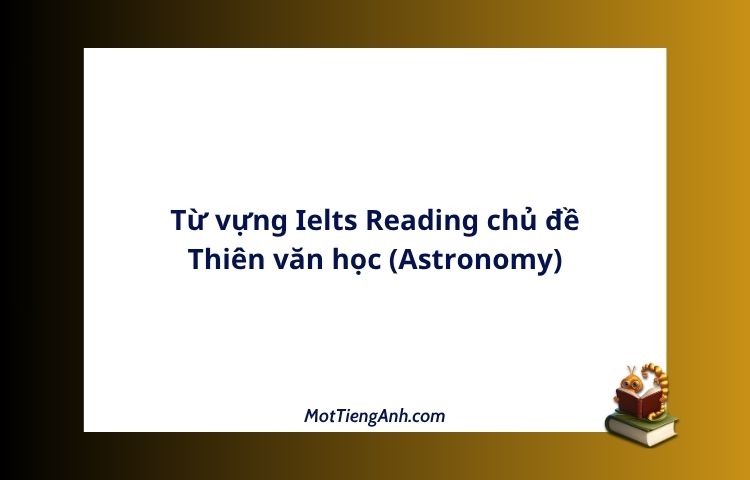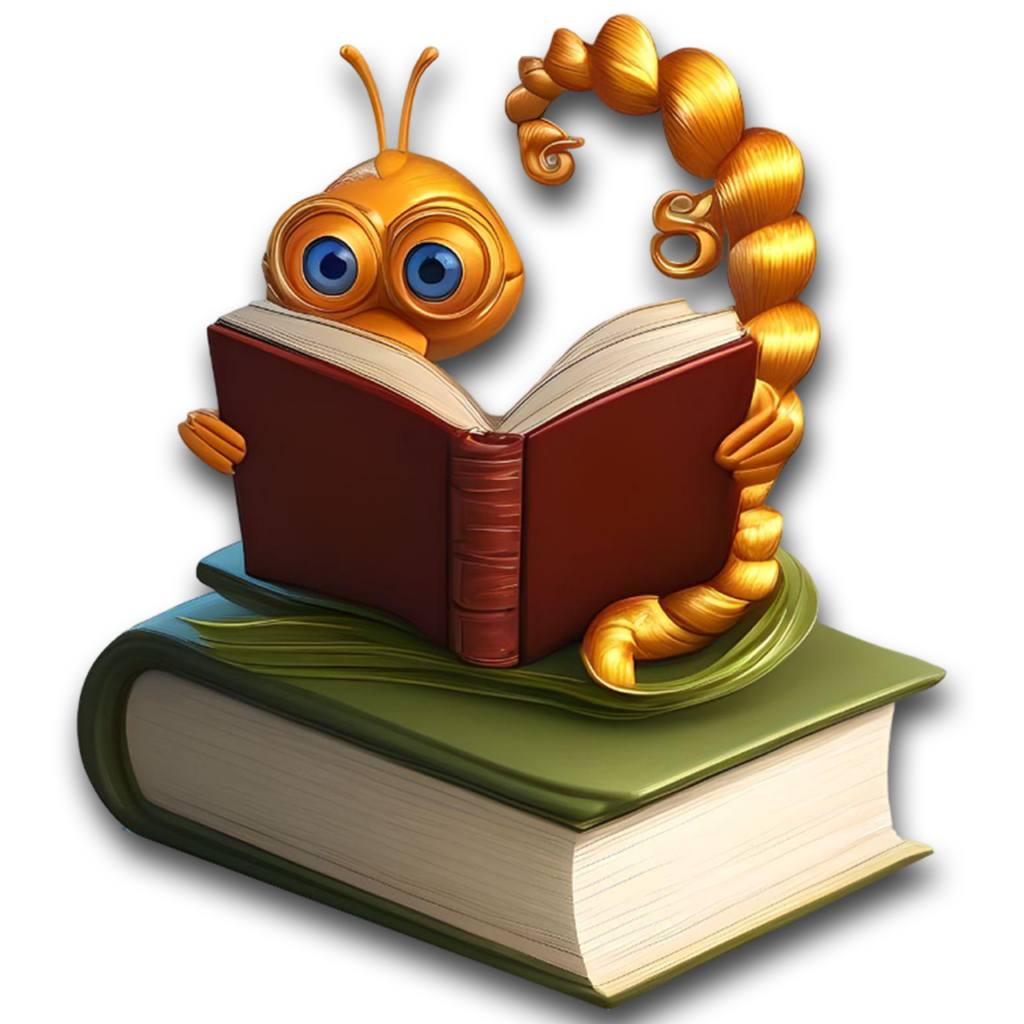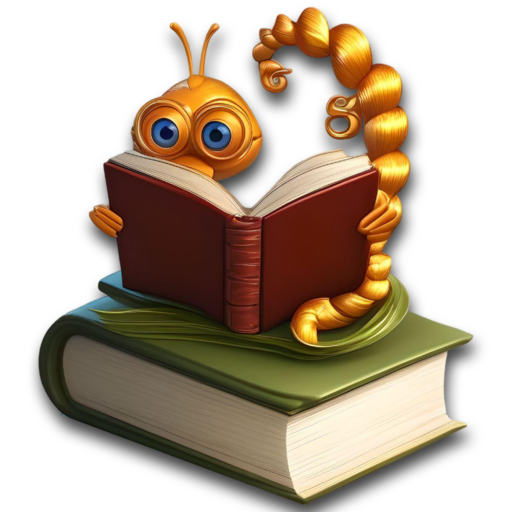Tổng hợp từ vựng IELTS Reading chủ đề Thiên văn học (Astronomy) đầy đủ nhất. Cùng Mọt Tiếng Anh chinh phục band điểm cao với list từ vựng học thuật kèm ví dụ chi tiết.

Từ vựng IELTS Reading chủ đề Thiên văn học (Astronomy)
1. Từ vựng cơ bản về Thiên văn học
|
Từ vựng |
Phiên âm |
Nghĩa |
Ví dụ |
|
Astronomy |
/əˈstrɒnəmi/ |
Thiên văn học |
Astronomy is the scientific study of celestial objects. |
|
Astronomer |
/əˈstrɒnəmər/ |
Nhà thiên văn học |
The astronomer discovered a new planet. |
|
Telescope |
/ˈtelɪskəʊp/ |
Kính thiên văn |
He observed the moon using a telescope. |
|
Planet |
/ˈplænɪt/ |
Hành tinh |
Earth is the third planet from the Sun. |
|
Galaxy |
/ˈɡæləksi/ |
Thiên hà |
The Milky Way is our home galaxy. |
|
Solar System |
/ˈsəʊlər ˈsɪstəm/ |
Hệ Mặt Trời |
The Solar System consists of the Sun and eight planets. |
|
Star |
/stɑːr/ |
Ngôi sao |
The closest star to Earth is the Sun. |
|
Moon |
/muːn/ |
Mặt trăng |
The Moon orbits the Earth. |
|
Orbit |
/ˈɔːbɪt/ |
Quỹ đạo |
The satellite is in orbit around the Earth. |
|
Gravity |
/ˈɡrævəti/ |
Trọng lực |
Gravity keeps the planets in orbit. |
2. Từ vựng nâng cao trong bài đọc học thuật
|
Từ vựng |
Nghĩa |
Ví dụ |
|
Celestial body |
Thiên thể |
The telescope detected a distant celestial body. |
|
Cosmic |
Thuộc về vũ trụ |
Cosmic rays originate from outside our solar system. |
|
Asteroid |
Tiểu hành tinh |
The asteroid belt lies between Mars and Jupiter. |
|
Comet |
Sao chổi |
The comet was visible for several days. |
|
Meteor |
Sao băng |
A meteor lit up the night sky. |
|
Black hole |
Hố đen |
Black holes have gravitational pulls so strong that not even light escapes. |
|
Light year |
Năm ánh sáng |
The galaxy is millions of light years away. |
|
Big Bang |
Vụ nổ lớn |
The Big Bang theory explains the origin of the universe. |
|
Exoplanet |
Hành tinh ngoài hệ Mặt Trời |
Scientists have discovered many exoplanets in recent years. |
|
Universe |
Vũ trụ |
The universe is constantly expanding. |
3. Các cụm từ học thuật hay gặp
|
Cụm từ |
Nghĩa |
Ví dụ |
|
Observe the sky |
Quan sát bầu trời |
Ancient people used to observe the sky for navigation. |
|
Space exploration |
Thám hiểm không gian |
Space exploration has expanded our understanding of the universe. |
|
Gravitational force |
Lực hấp dẫn |
Gravitational force affects all objects in space. |
|
Lunar eclipse |
Nguyệt thực |
A lunar eclipse occurs when Earth blocks sunlight from the moon. |
|
Solar eclipse |
Nhật thực |
A solar eclipse is a rare and awe-inspiring event. |
|
Launch a spacecraft |
Phóng tàu vũ trụ |
NASA launched a new spacecraft to study Mars. |
|
Deep space |
Không gian sâu |
Telescopes can capture images of deep space. |
|
Satellite imagery |
Hình ảnh vệ tinh |
Satellite imagery helps track weather and astronomical events. |
4. Một số tên hành tinh thường gặp trong bài đọc
|
Tên hành tinh |
Phiên âm |
Ghi chú |
|
Mercury |
/ˈmɜːkjəri/ |
Sao Thủy – gần Mặt Trời nhất |
|
Venus |
/ˈviːnəs/ |
Sao Kim |
|
Earth |
/ɜːθ/ |
Trái Đất |
|
Mars |
/mɑːz/ |
Sao Hỏa |
|
Jupiter |
/ˈdʒuːpɪtər/ |
Sao Mộc – hành tinh lớn nhất |
|
Saturn |
/ˈsætɜːn/ |
Sao Thổ – nổi tiếng với vành đai |
|
Uranus |
/ˈjʊərənəs/ |
Sao Thiên Vương |
|
Neptune |
/ˈneptjuːn/ |
Sao Hải Vương |
5. Các hiện tượng và khái niệm thiên văn thường gặp
|
Từ vựng |
Nghĩa |
Ví dụ |
|
Eclipse |
Nhật/Nguyệt thực |
An eclipse can be either partial or total. |
|
Constellation |
Chòm sao |
Orion is one of the most recognizable constellations. |
|
Nebula |
Tinh vân |
Nebulae are clouds of gas and dust in space. |
|
Space-time |
Không-thời gian |
Space-time is a fundamental concept in Einstein’s theory of relativity. |
|
Dark matter |
Vật chất tối |
Dark matter is invisible but makes up most of the universe’s mass. |
|
Red giant |
Sao khổng lồ đỏ |
Red giants are late-stage stars. |
|
Supernova |
Siêu tân tinh |
A supernova is the explosive death of a star. |
6. Từ vựng về thiết bị và nghiên cứu thiên văn
|
Từ vựng |
Nghĩa |
Ví dụ |
|
Observatory |
Đài thiên văn |
The observatory is located on a high mountain. |
|
Radio telescope |
Kính thiên văn vô tuyến |
A radio telescope detects radio waves from space. |
|
Space probe |
Tàu thăm dò không gian |
The space probe collected data from Saturn. |
|
Hubble Space Telescope |
Kính thiên văn không gian Hubble |
The Hubble Space Telescope has taken stunning images. |
|
Astronomical research |
Nghiên cứu thiên văn |
Astronomical research helps us understand the universe’s origin. |
7. Một số collocations và cụm từ ghi điểm cao
|
Collocation |
Nghĩa |
Ví dụ |
|
Explore distant galaxies |
Khám phá thiên hà xa xôi |
Telescopes allow us to explore distant galaxies. |
|
Unlock the mysteries of the cosmos |
Giải mã bí ẩn vũ trụ |
Scientists aim to unlock the mysteries of the cosmos. |
|
Measure cosmic distances |
Đo khoảng cách trong vũ trụ |
Light years are used to measure cosmic distances. |
|
Observe celestial movements |
Quan sát chuyển động thiên thể |
Ancient civilizations observed celestial movements for calendars. |
|
Trace the origin of the universe |
Truy tìm nguồn gốc vũ trụ |
The Big Bang theory traces the origin of the universe. |
8. Nguồn tài liệu luyện tập từ vựng Astronomy cho IELTS
|
Tài liệu |
Mục đích |
|
Cambridge IELTS 11 – Test 3 Passage 2 |
Bài đọc về “Our Solar System and Planets” |
|
Cambridge IELTS 14 – Test 1 Passage 3 |
Chủ đề về thiên văn học và khám phá vũ trụ |
|
NASA website (nasa.gov) |
Tra từ vựng và đọc tin tức về các dự án không gian |
|
BBC Earth hoặc National Geographic |
Nhiều bài viết về hành tinh, không gian và vũ trụ |
9. Tổng kết
Chủ đề Thiên văn học đòi hỏi thí sinh cần nắm vững lượng từ vựng học thuật phong phú về không gian, vật lý và khám phá khoa học. Hãy ghi nhớ từ vựng kèm ví dụ thực tế để dễ dàng hiểu bài đọc hơn trong kỳ thi IELTS.
Việc luyện tập từ vựng theo ngữ cảnh, đọc các bài mô phỏng đề thật và sử dụng flashcard sẽ giúp bạn cải thiện điểm số Reading nhanh chóng. Chúc bạn học tốt!
Bài viết đã tổng hợp từ vựng IELTS Reading chủ đề Thiên văn học thiết yếu nhất. Mọt Tiếng Anh tin rằng bạn sẽ áp dụng hiệu quả để bứt phá điểm số. Chúc bạn ôn thi tốt và đạt kết quả như mong đợi!


